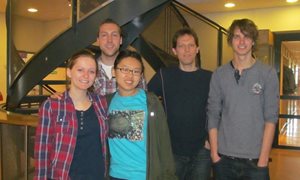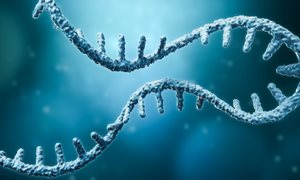20 August 2018
Publication: link.
 Gael Nicolas, a visiting scientist of the Human Genetics Department and Alexander Hoischen (photo), theme Infectious diseases and global health, and colleagues studied brain- and blood-DNA of sporadic early-onset Alzheimer’s disease (AD) patients, for somatic mutations in the known AD genes: e.g. APP, PSEN1, or PSEN2 using a very sensitive re-sequencing assay (smMIPs).
Gael Nicolas, a visiting scientist of the Human Genetics Department and Alexander Hoischen (photo), theme Infectious diseases and global health, and colleagues studied brain- and blood-DNA of sporadic early-onset Alzheimer’s disease (AD) patients, for somatic mutations in the known AD genes: e.g. APP, PSEN1, or PSEN2 using a very sensitive re-sequencing assay (smMIPs).
Publication: link.
Related news items

Epigenetics: Immunization is passed on to offspring Mice transmit adaptations to infections to next generations
19 October 2021 Does an infection affect the immunization of subsequent generations? It does, according to research now published in Nature Immunology. go to page
European research project raises hopes in fight against rare diseases Solve-RD successfully established an innovative approach to jointly re-analyze genomic and phenotypic data from unsolved rare disease patients
1 June 2021 For the first time in Europe hundreds of rare disease experts team up to actively share and jointly analyze existing data from unsolved rare disease patients. go to page
Miniaturized microfluidic platform for automated epigenetic profiling
6 May 2021 Together with Fluidigm, a US-based company focusing on microfluidics, the team of Hendrik Marks publishes in Genome Research the development of a powerful plug and play ChIP-seq platform for minute amount of cells, such as embryonic specimens or small biopsies. go to page
Current overview of intriguing RNA therapies
8 April 2021 In an article in EMBO Molecular Medicine, researchers from Radboudumc, together with European colleagues, provide an up-to-date overview of the (im)possibilities of these intriguing RNA therapies. go to page
Save the date for Radboud New Frontiers 2018: Betere zorg, netwerkzorg?
17 January 2018 After standard care, standardized care, and personalized care, network care will be care 4.0. But how exactly do you do that? Should we create new structures for it or is it just a matter of trust and ability to step back? go to page
